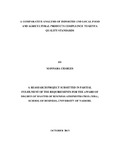| dc.contributor.author | Mannara, Charles | |
| dc.date.accessioned | 2014-01-13T13:55:47Z | |
| dc.date.available | 2014-01-13T13:55:47Z | |
| dc.date.issued | 2013 | |
| dc.identifier.citation | Mannara Charles (2013). A Comparative Analysis Of Imported And Local Food And Agricultural Products Compliance To Kenya Quality Standards. Master Of Business Administration | en_US |
| dc.identifier.uri | http://hdl.handle.net/11295/63435 | |
| dc.description.abstract | Kenya has a big agricultural potential, the continent of Africa as a whole has changed
from being a net exporter to become a net importer of agricultural products and Kenya is
not excluded. The persistence of this food-trade deficit has become a problem especially
since Kenya does not have cash and the sources of foreign currencies, including
agricultural export revenue, are used to pay for the rising food bills are limited. This
problem is further compounded by the tendency of the Kenyans who have a high
purchasing power to buy foreign food products instead of buying local products so as to
spur local production. Some of the reasons cited for the preference for imported products
is the "quality" tag. Imported products are "supposed" to be better than local ones. The
main objective of the study was therefore to determine whether this perception is true as
far as food and agricultural products coming into the Kenyan market are concerned. The
benchmark for the quality compliance used was adherence to Kenyan standards as
implemented by the Kenyan government through the Kenya Bureau of Standards. The
research design adopted was a case study that involved interviews with experts and a
comparison of local and imported products tested over a period of one year from June
2012 to May 2013. The study used an interview guide to collect the primary data while
the secondary data was mined from the records of Kenya Bureau of Standards food and
agriculture department. The study found that there was no significant difference in
quality compliance of food and agricultural products from the local and import sources at
a=0.05. The study also found that both local and imported food and agricultural product
met the criteria for quality compliance at a=0.05. The study recommended that the
reasons for difference in perception that imported food and agricultural products are of
superior quality to local food and agricultural products should be further interrogated by
dealing with individual food and agricultural products to determine which particular
products tend to display this as opposed to the study's generalised model. | en_US |
| dc.language.iso | en | en_US |
| dc.publisher | University of Nairobi | en_US |
| dc.title | A Comparative Analysis Of Imported And Local Food And Agricultural Products Compliance To Kenya Quality Standards | en_US |
| dc.type | Thesis | en_US |

